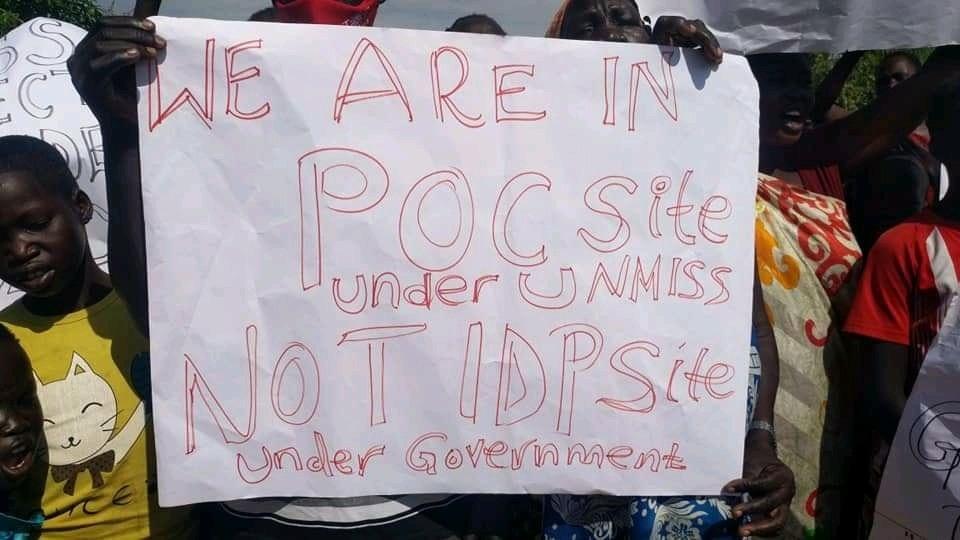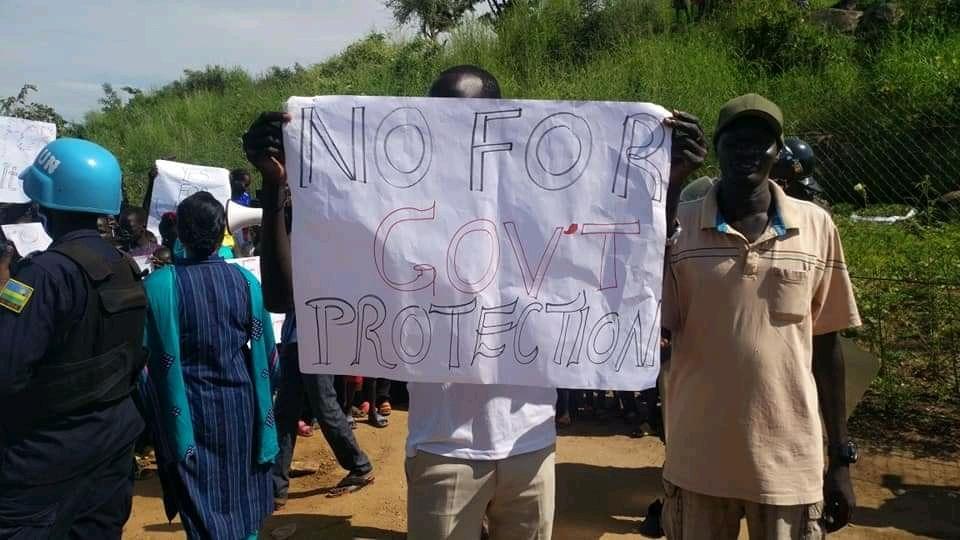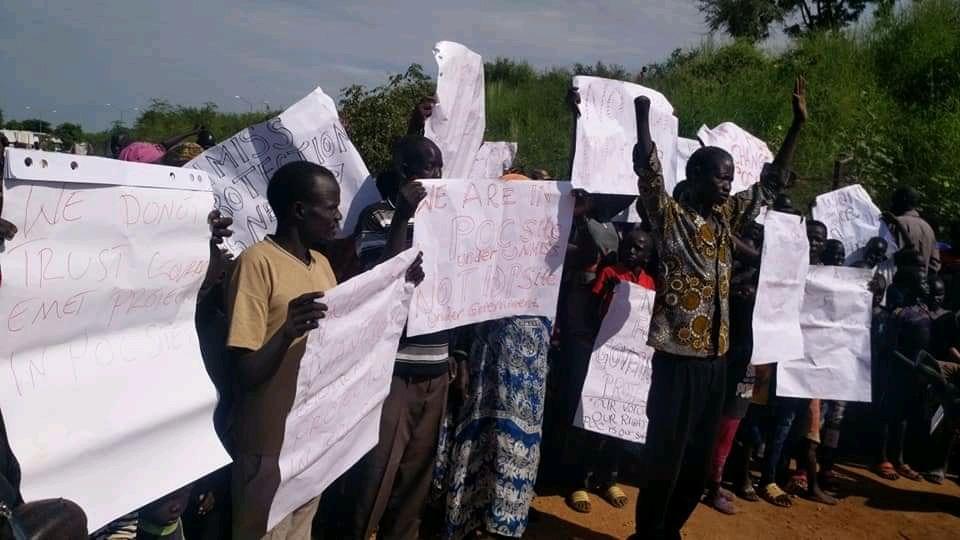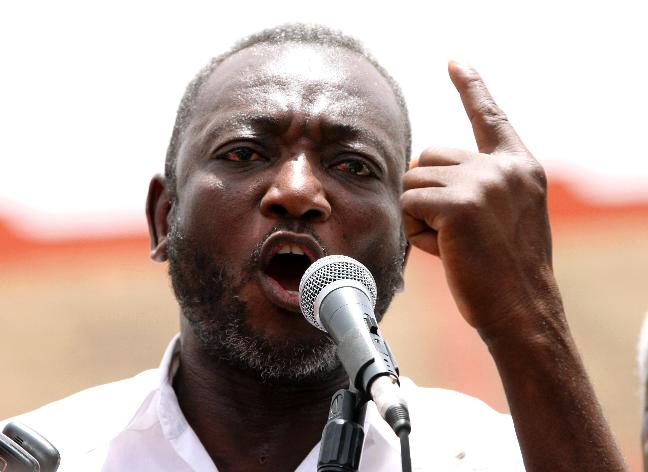
Debating Ideas is a new section that aims to reflect the values and editorial ethos of the African Arguments book series, publishing engaged, often radical, scholarship, original and activist writing from within the African continent and beyond. It will offer debates and engagements, contexts and controversies, and reviews and responses flowing from the African Arguments books.

Protest at the Protection of Civilians site in Juba that occurred on Wednesday 9 September 2020.
On 4 September, the UN mission in South Sudan (UNMISS) announced that it would withdraw its peacekeepers from the country’s Protection of Civilians sites (PoCs), reclassifying them as Internally Displaced Peoples (IDP) camps under the control of the South Sudanese government. UN officials imagine that this would finally remove their responsibility for these sites; a fantasy of finality. The days that followed saw those living in the PoCs protesting the UN’s decision. The protestors claimed that the security arrangements of South Sudan’s peace deal had not been implemented, nor county commissioners appointed, and the government was still killing its own civilians. Current conditions, the protesters stated, were not conducive to the mission unilaterally beginning to withdraw peacekeepers from the PoCs.
The PoCs were established when people fled into UN bases in December 2013, at the beginning of the South Sudanese civil war. While the UN anticipated that these sites would be short-lived, they have instead proved as protracted as the conflict itself. Over the last seven years of civil war, as South Sudan’s cities were razed to the ground and entire ethnic groups displaced from their land, the PoCs have offered civilians the prospect of finding safety behind hardened perimeters and the protection of UN peacekeeping forces, no matter how ambiguous such protection has proved in practice. Waves of government assaults on southern Unity and western Upper Nile states from 2014-18 swelled the populations of the PoCs in Bentiu and Malakal, the state capitals, as civilians fled a conflict that had killed 400,000 people by 2018. As of 18 June 2020, the last date for which there is overall data, 181,231 people still live in the PoCs.
In a press conference on 4 September, David Shearer, the head of UNMISS, announced that the security situation in South Sudan had improved to such an extent that peacekeepers could begin withdrawing from the PoCs, beginning with the smaller sites of Bor and Wau, where a gradual force reduction has been occurring over the past year. Shearer’s announcement comes on the back of consistent UNMISS hostility to the continued existence of the PoCs. In March, mission staff “very strongly encouraged people in the PoCs to return home,” and Shearer stated that the “risk of political violence has certainly lowered, including the threat to those living in UN PoCs.”
UN justifications for the removal of peacekeepers rely on its claim that with the formation of the transitional government in February, South Sudan is finally on the road to peace and recovery, and the level of violence around the country has decreased. The problem with this claim is that even UNMISS thinks it’s false. The mission’s Human Rights Division recently released its own quarterly briefing for April-June 2020, the period immediately after the formation of the transitional government. It found that this period was far more violent than the corresponding period in 2019, with four times as many civilian victims of violent attacks.
Rather than the formation of the national government leading to peace and security in South Sudan, it has actually intensified violence in the country, as military forces realign to reflect the changing balance of power in the capital, leading to clashes. This follows long-term patterns of government violence, including through the justice system, despite peace agreements. In the past six months, for instance, fighting between the Murle, Lou Nuer, and Dinka in Jonglei, with all sides backed by commanders and politicians in Juba, have left at least 600 dead. In Western Bahr el Ghazal, the government has engineered splits inside the Sudan People’s Liberation Army in Opposition (SPLA-IO) which have led to repeated clashes between armed groups, displacing people around Wau, the site of one of the PoCs where the UN is currently withdrawing peacekeepers. In Western Equatoria, government forces, alongside SPLA-IO, attacked National Salvation Front (NAS) positions, as the civil war continues in South Sudan.

South Sudan’s Injustice System Law and Activism on the Frontline
Rachel Ibreck, With a preface by Alex de Waal from the African Arguments book series published by ZED
So how can UNMISS claim that violence in South Sudan has decreased? In Shearer’s statements, the word political is working overtime. Political violence, UNMISS contends, would be between the two principal signatories to the peace agreement: the government and the SPLA-IO. But because these parties are in a transitional government and actually fighting together in some places, the violence that is currently occurring in South Sudan is not thought of as political. In Jonglei, for instance, clashes in Pibor and elsewhere have been characterized as ‘inter-communal violence,’ or more recently as ‘sub-national conflict.’ As with clashes elsewhere in South Sudan, the national dimensions of violence in Jonglei are downplayed by a UN mission that wants to hand over responsibility for the PoCs to a government still at war with its own citizens.
The residents of the PoCs, however, do not feel as sanguine as Shearer. Michael, who lives in the PoC in Juba, told us that he was profoundly disappointed with Shearer’s statement.[1]“The peace deal is still not implemented,” he said, “and there is no security in this country. I don’t feel safe leaving the PoC.” Much rests on how one evaluates the safety of the camps. The mission has insisted any reduction of peacekeepers from a PoC site will only be made after a careful security analysis. Recent internal UNMISS security assessments, however, have downplayed political dynamics in favour of crude military metrics like the number of clashes in the last few months. This leads to markedly different evaluations of risk by UNMISS and the residents of the PoCs.

Protest at the Protection of Civilians site in Juba that occurred on Wednesday 9 September 2020.
The situation in Malakal is a good example. Two recent internal reports by the UNMISS Upper Nile field office argue that the PoC in Malakal should be closed because “there are no longer threats of physical harm to PoC site residents.” However, while it is true the level of violence in Malakal is much reduced from what it was three years ago, there remain deep political antagonisms that might turn into violence at any time: these substantive political issues have not been addressed, but remain seemingly invisible to the authors of UNMISS security evaluations. The residents of the Malakal PoC were forcibly displaced from their homes by government forces from 2014-18, with many fleeing to the UN base during what the UN Commission on Human Rights in South Sudan described as “a pattern of ethnic cleansing and population engineering”. Those that carried out this ethnic cleansing remain in power in Upper Nile. The mission had not done the necessary work on housing, land, and property issues that would enable the IDPs to return to the land from which they were displaced. In some cases, their former homes have been occupied by the very government ministers who would be responsible for the IDPs if the UN were to withdraw from the PoC. Residents in the Malakal PoC told us it is still not safe for them to return, and pointed to recent attacks on civilians who have tried to resettle outside the site. Worse, they stated, the governor of Upper Nile has still not been appointed. “How can the UN talk about abandoning us,” one resident asked, “when the most controversial appointment in the government has yet to be made?”
The mission has claimed that the withdrawal of UN peacekeepers will not mean that people will be forced to leave what will become an IDP camp. However, this claim underplays the severity of the transformation that will occur. At present, while the PoCs are built on the territory of the host state (in this case South Sudan), the land—like all UN bases—is designated as under the exclusive control and authority of the UN. This is language much like that found in the Vienna Convention on Diplomatic Relations, as it pertains to embassies around the world. The PoCs exist because the civilians hiding within cannot avail themselves of the protection and services of the host government. The transformation of the PoCs into IDP camps would mean that the government will be responsible for these sites. To access the PoCs, for instance, humanitarians would have to negotiate with the South Sudanese authorities rather than the UN, while rule of law would be a matter for the South Sudanese National Police Service (SSNPS), rather than for the UN police service and the complex mixture of ad-hoc and informal juridical instruments that have determined legal issues in the camps for the last seven years.
Residents of the Bentiu PoC told us that the SSNPS is a problem. James is from southern Unity, and sought shelter with the UN in 2015, when government forces moved south from Bentiu, in a months-long campaign in which villages were razed, civilians killed, and sexual violence employed as a weapon of war. Central to the government’s campaign was a Bul Nuer militia from Mayom county, organized at the behest of Salva Kiir (the South Sudanese president) and Nguen Monytuil (the current governor of Unity state) by John Bul Mayik: the man who is currently the police commissioner for Unity state. Those who were responsible for displacing James will soon be responsible for his protection. While the UN mission claims that the SSNPS is doing joint patrols around Bentiu with the SPLA-IO, that doesn’t reassure James. “The Bul Nuer control this state,” he told us, “how can we trust them after what they have done?” The Nuer of southern Unity have heard it all before. In 2015, another peace agreement was signed and people were encouraged to return home, only to face a Bul Nuer offensive that killed thousands.
James doesn’t feel comfortable in an IDP camp controlled by the very government that tried to kill him, but he has nowhere else to go. Massive level of displacement and the turbulence of the civil war have left complicated and unresolved questions of land rights and ownership throughout South Sudan, but especially in Juba, Bentiu, Malakal, and Wau: the sites of the largest PoCs. In his comments at a press conference on 4 September, Shearer stated that “it will be the government’s responsibility to find other land for these people.” What this statement elides is that it is the government that has gained from the last seven years of war, through the violent occupation of the land of those currently in the PoCs, and it is perverse to now imagine that the victors will give up their spoils.

Protest at the Protection of Civilians site in Juba that occurred on Wednesday 9 September 2020.
These issues have consistently been downplayed by a UN mission that insists that PoC residents “stay just to access services,” as Shearer stated on 4 September. The claim that those who live in the PoCs are effectively welfare parasites that take up a disproportionate quantity of the mission’s resources is widely held within UNMISS. “People outside the PoCs don’t get this level of support,” one UN officer told me, “why should those inside?” The often-traumatized residents of the PoCs don’t see things in the same way. They have only limited access to food, water, and shelter, and criminal activity at the sites is often widespread. Nonetheless, mission staff worry that PoC residents are becoming too dependent on humanitarian assistance, and delink these concerns about dependence from a consideration of the broader context in which the PoCs exist.
The outsized place that the PoCs occupy in the UN imagination frequently makes them the scapegoat for a variety of mission ills. For instance, the UN mission often blames its poor record of protecting civilians in South Sudan on the amount of resources and manpower it dedicates to the PoCs. On 4 September, Shearer stated that “withdrawing from these sites [the PoCs] means that those troops who were occupied … can be redeployed to hotspots where people’s lives are in immediate danger.” In reality, as a 2019 UN report makes clear, only 14% of the peacekeeping force is engaged in protecting the PoCs. In a 2016 report for the UN’s migration agency (IOM), Mike Arensen states that UNMISS has never been able to protect civilians outside its bases, and the PoCs were being used as a scapegoat for the mission’s wider failings. Indeed, from the perspective of the UN’s mandate to protect civilians, the PoCs are the one success story that UNMISS could brandish as good news in New York.
UNMISS covers up the good news, and tries to close the PoCs, because of its desire to ingratiate itself with the South Sudanese government. Since winning a series of military victories in South Sudan’s urban centres, which sent people fleeing into the PoCs, the government has pushed for them to be closed. It sees the PoCs as an unwelcome reminder that the civilian population of the country still fears the government. Alan Boswell, an expert on South Sudan at the International Crisis Group, said that: “The UN believes the camps complicate its relations with the host government, take up significant mission resources, and risk turning into quasi permanent UN-run settlements.” Withdrawing from the PoCs would mean celebrating that peace has come to South Sudan, and be an important step in repairing UNMISS’ relationship with the South Sudanese government. A celebration of peace in Juba, though, as we have so often seen in South Sudan, does not mean that all is tranquil in the periphery, nor does it mean that it is safe to leave the PoCs. As we see throughout South Sudan at the moment, the war continues, except now, the government and UNMISS call it peace.
Many of the criticisms of the PoCs made within the UN mission are correct. Hardened UN-protected camps dependent on international aid are clearly not a sustainable model for urban organization in South Sudan. In an ideal world, the PoC sites would not exist. However, they do exist, and for real reasons. Government campaigns of displacement and violence led people to flee into the PoCs. These campaigns continue in the present, even if the UN mission determines them to be “non-political.” South Sudan is still engulfed in violence, and the commanders that razed the homes of the PoC residents of Bentiu and Malakal still control the state government in both places. In this context, the UN’s fantasy of finally being done with the PoCs and resuming relations with the government is particularly dangerous.
End Notes:
[1] All names of interviewees have been changed to ensure their safety and security.







This is a great article which mostly hits the nail on the head. However, saying that UNMISS wants to close the PoCs ‘because of its desire to ingratiate itself with the South Sudanese government’ is a simplification. UNMISS also gets pressure about the PoCs from other UN member states including the near neighbours of South Sudan. UNMISS is also subject to significant budgetary and political pressures from UNHQ and from diplomatic missions in NY including complaints from troop contributing countries about their staff working in PoCs. At the core of the issue is a central dilemma in peacekeeping – UNMISS is constituted of member states with a natural inclination to support the rights of another member state. These are not excuses for why UNMISS is right – it isn’t – but some more context is needed to understand its decision-making.
Thanks James. You are right, of course, that there are many complex reasons why UNMISS wants to close the PoCs. And I really look forward to UNMISS setting them out and explaining its actual reasons for its plan.
All the very best,
Joshua
Thanks a lot for a great article. While it is true that UNMISS uses the “political conflict excuse” a lot, it should also be noted that Shearer himself has admitted communal clashes are not always apolitical:
“Fighters in uniform have been observed amongst those engaged in the violence indicating that more organized forces may be joining,” Shearer told VOA.”
UNMISS clearly knows that politics are often at play:
ANDREW GILMOUR, Assistant Secretary-General for Human Rights, said the Mission’s human rights division: ” Frequently referred to as “cattle raids” or “intercommunal violence”, such incidents have largely evolved from traditional practices into acts of political violence, he noted. The progressive restriction of political and civic space is also a worrying trend, he said, pointing out that freedom of expression in particular is constantly under attack.”
https://www.un.org/press/en/2019/sc13857.doc.htm
https://www.voanews.com/africa/south-sudan-focus/south-sudan-mission-chief-warns-more-inter-communal-violence-could-unravel
what is in chloroquine https://chloroquineorigin.com/# hydroxychlorequine
chloroquine dosage hydroxychloroquin hydroxychloroquine side effects heart